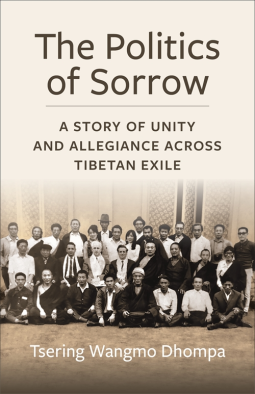The Politics of Sorrow
Unity and Allegiance Across Tibetan Exile
by Tsering Wangmo Dhompa
You must sign in to see if this title is available for request. Sign In or Register Now
Part of Studies of the Weatherhead East Asian Institute, Columbia University
Send NetGalley books directly to your Kindle or Kindle app
1
To read on a Kindle or Kindle app, please add kindle@netgalley.com as an approved email address to receive files in your Amazon account. Click here for step-by-step instructions.
2
Also find your Kindle email address within your Amazon account, and enter it here.
Pub Date 18 Feb 2025 | Archive Date 7 May 2025
Talking about this book? Use #ThePoliticsofSorrow #NetGalley. More hashtag tips!
Description
The Dalai Lama escaped from Tibet in 1959 after its occupation by China and established a government in exile in India. There, Tibetan leaders aimed to bring together displaced people from varied religious traditions and local loyalties under the banner of unity. To contest Chinese colonization and stand up for self-determination, Tibetan refugees were asked to shed regional allegiances and embrace a vision of a shared national identity.
The Politics of Sorrow tells the story of the Group of Thirteen, a collective of chieftains and lamas from the regions of Kham and Amdo, who sought to preserve Tibet’s cultural diversity in exile. They established settlements in India in the mid-1960s with the goal of protecting their regional and religious traditions, setting them apart from the majority of Tibetan refugees, who saw a common tradition as the basis for unifying the Tibetan people. Tsering Wangmo Dhompa traces these different visions for Tibetan governance and identity, juxtaposing the Tibetan government in exile’s external struggle for international recognition with its lesser-known internal struggle to command loyalty within the diaspora. She argues that although unity was necessary for democracy and independence, it also drew painful boundaries between those who belonged and those who didn’t. Drawing on insightful interviews with Tibetan elders and an exceptional archive of Tibetan exile texts, The Politics of Sorrow is a compelling narrative of a tumultuous time that reveals the complexities of Tibetan identities then and now.
The Politics of Sorrow tells the story of the Group of Thirteen, a collective of chieftains and lamas from the regions of Kham and Amdo, who sought to preserve Tibet’s cultural diversity in exile. They established settlements in India in the mid-1960s with the goal of protecting their regional and religious traditions, setting them apart from the majority of Tibetan refugees, who saw a common tradition as the basis for unifying the Tibetan people. Tsering Wangmo Dhompa traces these different visions for Tibetan governance and identity, juxtaposing the Tibetan government in exile’s external struggle for international recognition with its lesser-known internal struggle to command loyalty within the diaspora. She argues that although unity was necessary for democracy and independence, it also drew painful boundaries between those who belonged and those who didn’t. Drawing on insightful interviews with Tibetan elders and an exceptional archive of Tibetan exile texts, The Politics of Sorrow is a compelling narrative of a tumultuous time that reveals the complexities of Tibetan identities then and now.
Advance Praise
"Poignant and deeply personal, The Politics of Sorrow delves into the heart of the Tibetan struggle for identity. Grappling with the profound question of what constitutes a national identity amid the challenges of displacement, Dhompa chronicles Tibetans’ arduous pursuit of building a nation in exile and invites readers to witness a community’s journey to discover its voice."
--Tsering Shakya, author of The Dragon in the Land of Snows: A History of Modern Tibet Since 1947
Available Editions
| EDITION | Other Format |
| ISBN | 9780231212472 |
| PRICE | US$28.00 (USD) |
| PAGES | 352 |
Available on NetGalley
NetGalley Reader (EPUB)
NetGalley Shelf App (EPUB)
Send to Kindle (EPUB)
Download (EPUB)




